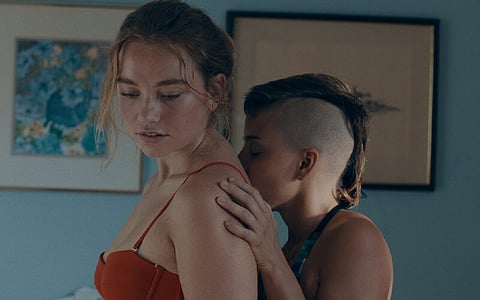
- Reviews
- Power List 2024
- Cannes 2024
- In-Depth Stories
- Web Stories
- News
- FC Lists
- Interviews
- Features
- FC SpecialsFC Specials

Whenever we hear the words 'fairy tale', we are conditioned to think about a damsel-in-distress, a charming prince in shining armour, and, in most cases, an evil stepmother. We are not wrong in making these assumptions. So when I first read the movie's title, before watching it, I assumed that we would probably encounter a similar range of characters in their natural fairy tale habitat, but Princess Cyd, happily, proved me wrong. Directed and written by Stephen Cone, the movie recounts the stay of a regular teenage girl named Cyd (played by Jessie Pinnick) at her aunt's place in Chicago for a couple of weeks during the summer months of her 16th year. It is an everyday tale with no prince, no quest, no wars, and no evil characters, but it offers itself up as a way of reviewing our assumptions about fairy tales and their female characters.
Cyd is our female protagonist, but she is far from being in distress. She is a teenager who knows what she wants and freely asserts her desires. When she walks into her aunt's place, she is candid in her confession about her disinterest in books, knowing fully well that her aunt is a famous writer and risking a bad first impression. Throughout the rest of the movie, she makes no effort to turn this scenario around. She happens to read one of her aunt's books but only passes superficial, almost formal, comments about it, as if out of obligation. In fact, we find her dressed in an elegant, albeit borrowed, tuxedo for the soirée at her aunt's place, which is the fairy tale equivalent of a ball party at the king's palace.
When she has lost her way home while returning from one of her runs around the neighbourhood, she happens to be helped by Katie (played by Malic White), a waitress at a local barista who lives with her brother in a small apartment. The notion of a knight-in-shining-armour goes for a toss as Cyd and Katie develop a strong attraction towards each other. It is not only the quintessential heterosexual relationship trope that is challenged by this move. Cyd is shown to be gaily exploring her sexuality but not with the sense of confusion that most teenagers tend to display at that age. She is open as well as accepting, even welcoming, in her attitude.
One of my personal favourite characters in the movie is Cyd's aunt, Miranda Ruth, played by the beautiful Rebecca Spense. Unlike the evil stepmother in fairy tales, she welcomes Cyd, with her ideas and beliefs, into her life. She appears a little disconcerted when she finds out how different she is from her niece, but even in a moment of brief tension, she logically argues that they are both "different shapes and ways" and that their "happiness is unique". She wants to enjoy the time she spends with her instead of acting like a disciplinarian guardian. The aunt's house becomes a comfortable home for Cyd. It is a space for thriving female friendship, expression and choices. Unlike the typical need for a fairy-tale protagonist to leave her chambers to experience the freedom she desires for herself, Aunt Miranda's house, and her room, becomes a space for Cyd to explore this freedom. Miranda helps Cyd to come to terms with her mother's accidental death years ago. By the end of the movie, we see them sharing an intimate bond, one that exudes familial love and affection.
Even the generic idea of 'rescuing' the female protagonist from danger has been reconstructed in the movie. When Katie needs help, Miranda and Cyd help her get out of the apartment and stand by her emotionally as she copes with the incident. All three characters are shown to be enjoying life in their own ways and taking notice of their choices. Princess Cyd is an exploration of how a fairy tale can be looked at in today's times. The city of Chicago blooms in all its summer glory in the course of the movie. It is a visual treat that helps one rethink and navigate the nuances of modern-day friendships, relationships and the many manifestations of 'love' through an almost equally distributed screen time among its lead female characters.